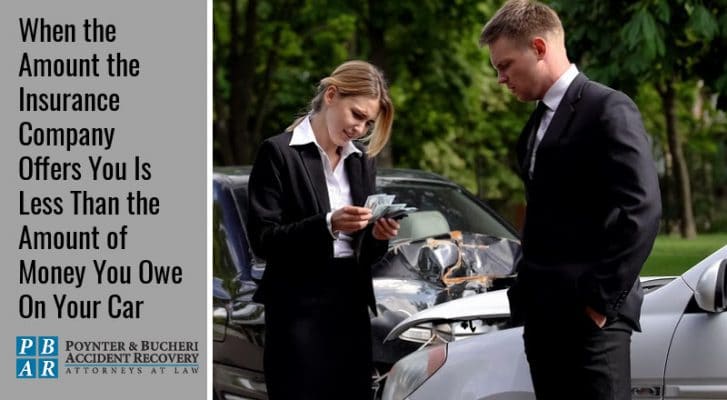
When the Amount the Insurance Company Offers you is Less Than the Amount of Money You Owe on your Car

What you’ll learn from reading this article:
- Why insurance companies give you less back than you owe
- How the actual cash value (ACV) of your car is determined
- What to do to negotiate for more money
Getting into a car accident and totaling your car can significantly affect your daily life. On top of any injuries sustained and being without a means of transportation, there is also the issue of what to do if you still owe money on the car.
Unfortunately, it is quite common for insurance companies to offer less than what you need to pay off the car loan. This can put many in a tight spot — not only are you left without a car, but you will also have to continue paying off that loan or roll the deficit into a new loan for a new car.
For these reasons, it’s important to negotiate for the highest compensation possible. To help you better understand the process, we’ve gathered some useful information below. When in doubt, contact your local car accident attorneys with any questions you may have.
Why Is Insurance Giving Me Less Than What I Owe On My Car?
While you might think that the value of your car is equal to the cost of the loan, this isn’t true. Many factors can lead to a decrease in a car’s value, and unfortunately, insurance companies only have to pay what the car is considered to be worth on the open market.
How Car Depreciation Works
A car depreciates in value the second you drive it off the lot. In the first year alone, it can depreciate by as much as 20% or more and can decrease in value by 60% after the first five years. This doesn’t mean you shouldn’t buy new cars, but it’s something to keep in mind. While a brand new shiny vehicle on a car lot might look nice and cost a pretty penny, the second you start driving it, it becomes worth less than what you just paid for it.
Factors such as mileage and the condition of the car, as well as any repairs the car has gone through, will affect the cash value. For example, your car could still be in amazing condition, but if it had to be repaired at any point to get it looking that way again, it will greatly affect the value of the car — even if you can’t tell the difference.
Insurance Is Only Obligated to Pay the Actual Cash Value
The open market, or Kelley Blue Book, determines what your car is actually worth, which will not be the same as the loan amount. And according to the law, insurance companies are only obligated to pay the actual cash value (ACV) for your car, even if you still owe money on the loan.
They will determine how much money to give you by looking at past accidents, how many miles you have put on the vehicle, and what kind of condition it is in from years of wear and tear. All of these factors can result in an amount that is significantly lower than what you are still paying on the loan. Your collision deductible can also affect how much you receive. If your deductible is $1,000, for example, and the ACV is determined to be $10,0000, your insurance will only give you $9,000.
What to Do If My Car Is Totaled and I Still Owe Money on the Loan?
If your car is totaled and you are worried about not receiving enough money from insurance to pay off the loan, there are a few things you can do that may help:
- Verify the Value: As stated above, insurance companies will simply use standard, basic information to determine the cash value of your car. However, if you think this number is incorrect or if any factors might make the price higher, you should let them know. For example, if there were any items of value that were in the car when it was damaged or if you made any modifications to the vehicle after it was purchased, these are things that could increase the amount of money you get back.
- Use Your Bodily Injury Claim: If you choose to work with an attorney and pursue a bodily injury claim, you may be able to negotiate for more money to help cover what you didn’t get back from insurance for the cash value of the car.
- Gap Insurance: If you have gap insurance, this may help you get the difference between the actual cash value of your car and what is still owed on the loan. However, you would need to have purchased this type of insurance at the time that you obtained the initial car loan.
- Keep Making Payments: Unfortunately, if you still owe money after your payout from insurance, you are legally obligated to continue paying the lender until the loan is paid off. Even if you are still waiting to hear how much money you will be getting back, you should keep making payments so as not to go into default or accrue more debt from late payments.
Poynter & Bucheri Accident Recovery — Indianapolis Personal Injury Attorneys
If you sustained injuries during the accident or have any questions about filing a claim, contact the accident recovery experts at Poynter & Bucheri. Our fee is only 25% compared to higher 40% rates with other attorneys. We will ensure you are properly compensated for your injuries and losses. Don’t hesitate — one of our experienced attorneys can assist you right away. Call 1-800-265-9881 for a free case review.
